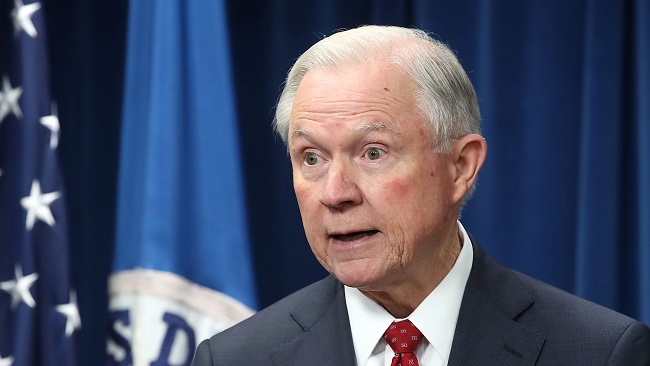
Despite formally recusing himself from any and all congressional investigations into Donald Trump’s alleged ties to Russia, Attorney General Jeff Sessions isn’t without controversy in his new office. The former Alabama senator, whom many believe perjured himself and should be appropriately censured, drew further ire on Friday when the Department of Justice announced it was seeking resignations from 46 U.S. attorneys appointed by President Barack Obama. Many of those affected found out about their firings through the media, instead of hearing directly from DOJ officials — including Sessions himself.
DOJ spokesperson Peter Carr informed the Associated Press Trump had asked two U.S. attorneys, Dana Boente and Rod Rosenstein, to stay. “The president called Dana Boente and Rod Rosenstein tonight to inform them that he has declined to accept their resignation,” said Carr. “They will remain in their current positions” — acting deputy attorney general in Boente’s case, and Maryland’s district attorney for Rosenstein. (The latter is slated to become the next deputy attorney general.)
As for the rest, they were expected to hand in their resignation and leave their posts immediately. According to CNN, Boente “was in the beginning stages of calling each US attorney individually to tell them they had to resign when the DOJ issued a statement.” This caused anger among many of the prosecutors affected by Sessions’ memo, especially since they only found out through the news. Yet as another department spokesperson indicated, this was simply a tradition:
“As was the case in prior transitions, many of the United States attorneys nominated by the previous administration already have left the Department of Justice. The attorney general has now asked the remaining 46 presidentially appointed US attorneys to tender their resignations in order to ensure a uniform transition,” Justice Department spokesperson Sarah Isgur Flores said.
Flores isn’t wrong. Per a 2007 report by the Los Angeles Times, the regular replacement of one administration’s federal attorneys by another dates back to Ronald Reagan’s administration. At the time, Democrats were accusing the justice department under George W. Bush of unfairly politicizing it by removing prosecutors appointed by his predecessor, Bill Clinton. Yet the paper’s investigation determined not only did Clinton do the same, but so did George H.W. Bush and Reagan before him.
Even so, the manner in which Sessions and his staff handled the matter is what has especially angered the outgoing attorneys and other critics. An anonymous source told CNN “this could not have been handled any worse,” due largely to the lack of warning the prosecutors were given. What’s more, others familiar with the situation revealed “there was not any particular clarity from the Justice Department as to what the future held.”
Perhaps most damaging to Sessions and the department’s expressed desire to paint the announcement as a typical, orderly move were Sen. Dianne Feinstein’s (D-California) comments. Back in January, she apparently met with White House Counsel Donald McGahn and Vice President Mike Pence to ask “whether all U.S. attorneys would be fired at once.” They told her “done in an orderly fashion to preserve continuity,” but as Feinstein noted in her statement, “clearly this is not the case.”
(Via CNN and Associated Press)
